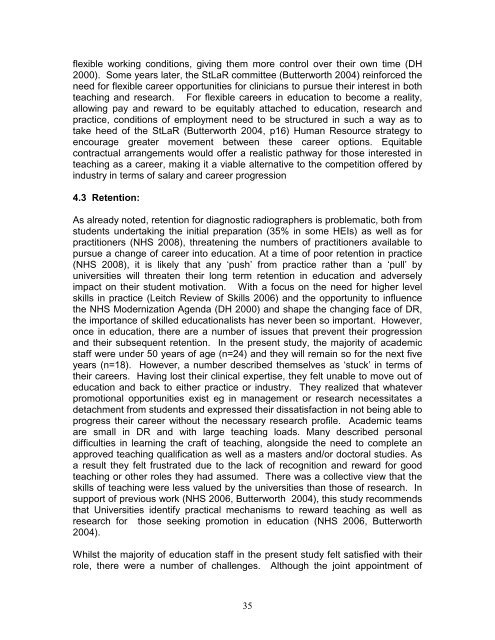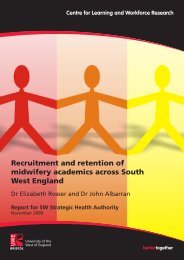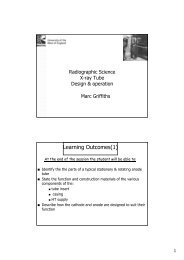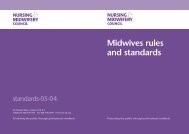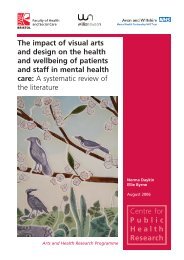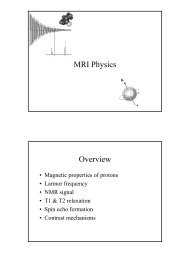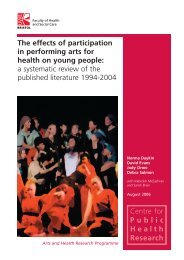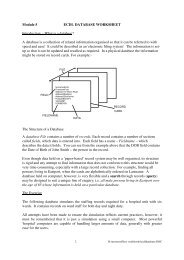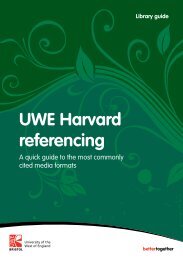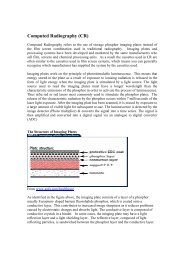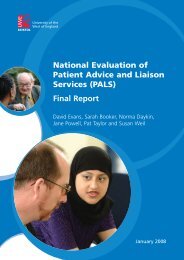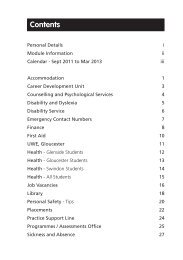Recruitment and retention of diagnostic radiography academics ...
Recruitment and retention of diagnostic radiography academics ...
Recruitment and retention of diagnostic radiography academics ...
- No tags were found...
You also want an ePaper? Increase the reach of your titles
YUMPU automatically turns print PDFs into web optimized ePapers that Google loves.
flexible working conditions, giving them more control over their own time (DH2000). Some years later, the StLaR committee (Butterworth 2004) reinforced theneed for flexible career opportunities for clinicians to pursue their interest in bothteaching <strong>and</strong> research. For flexible careers in education to become a reality,allowing pay <strong>and</strong> reward to be equitably attached to education, research <strong>and</strong>practice, conditions <strong>of</strong> employment need to be structured in such a way as totake heed <strong>of</strong> the StLaR (Butterworth 2004, p16) Human Resource strategy toencourage greater movement between these career options. Equitablecontractual arrangements would <strong>of</strong>fer a realistic pathway for those interested inteaching as a career, making it a viable alternative to the competition <strong>of</strong>fered byindustry in terms <strong>of</strong> salary <strong>and</strong> career progression4.3 Retention:As already noted, <strong>retention</strong> for <strong>diagnostic</strong> radiographers is problematic, both fromstudents undertaking the initial preparation (35% in some HEIs) as well as forpractitioners (NHS 2008), threatening the numbers <strong>of</strong> practitioners available topursue a change <strong>of</strong> career into education. At a time <strong>of</strong> poor <strong>retention</strong> in practice(NHS 2008), it is likely that any ‘push’ from practice rather than a ‘pull’ byuniversities will threaten their long term <strong>retention</strong> in education <strong>and</strong> adverselyimpact on their student motivation. With a focus on the need for higher levelskills in practice (Leitch Review <strong>of</strong> Skills 2006) <strong>and</strong> the opportunity to influencethe NHS Modernization Agenda (DH 2000) <strong>and</strong> shape the changing face <strong>of</strong> DR,the importance <strong>of</strong> skilled educationalists has never been so important. However,once in education, there are a number <strong>of</strong> issues that prevent their progression<strong>and</strong> their subsequent <strong>retention</strong>. In the present study, the majority <strong>of</strong> <strong>academics</strong>taff were under 50 years <strong>of</strong> age (n=24) <strong>and</strong> they will remain so for the next fiveyears (n=18). However, a number described themselves as ‘stuck’ in terms <strong>of</strong>their careers. Having lost their clinical expertise, they felt unable to move out <strong>of</strong>education <strong>and</strong> back to either practice or industry. They realized that whateverpromotional opportunities exist eg in management or research necessitates adetachment from students <strong>and</strong> expressed their dissatisfaction in not being able toprogress their career without the necessary research pr<strong>of</strong>ile. Academic teamsare small in DR <strong>and</strong> with large teaching loads. Many described personaldifficulties in learning the craft <strong>of</strong> teaching, alongside the need to complete anapproved teaching qualification as well as a masters <strong>and</strong>/or doctoral studies. Asa result they felt frustrated due to the lack <strong>of</strong> recognition <strong>and</strong> reward for goodteaching or other roles they had assumed. There was a collective view that theskills <strong>of</strong> teaching were less valued by the universities than those <strong>of</strong> research. Insupport <strong>of</strong> previous work (NHS 2006, Butterworth 2004), this study recommendsthat Universities identify practical mechanisms to reward teaching as well asresearch for those seeking promotion in education (NHS 2006, Butterworth2004).Whilst the majority <strong>of</strong> education staff in the present study felt satisfied with theirrole, there were a number <strong>of</strong> challenges. Although the joint appointment <strong>of</strong>35


